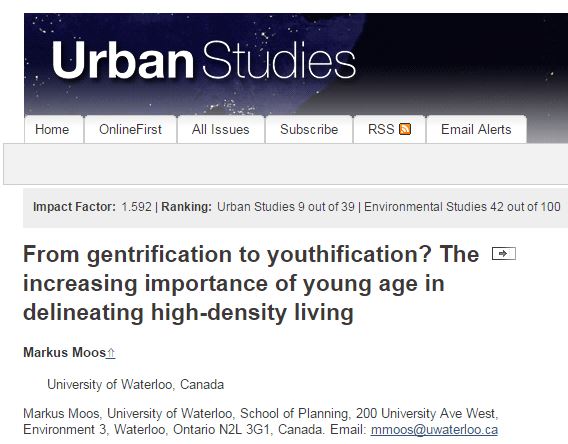… Today, inner cities contain more amenities, public transit and housing options than in the past but there are also growing affordability concerns owing to rising prices. Especially young adults, sometimes dubbed Millennials, are making location decisions in a context of lower employment security, higher costs and continuing high-density re-development that now extends into suburban areas in some cases.
The analysis in this paper shows evidence of a youthification process that results in an increasing association of high-density living with the young adult lifecycle stage. The higher density areas remain young over time as new young adults move into neighbourhoods where there are already young people living, and they move out if their household size increases.
Youthified spaces have become characterised by small housing units that are not generally occupied by households with children. Additionally, some areas are exhibiting generational bifurcation as both older and younger adults live in some higher density areas.
Youthification is driven by a combination of lifestyle, demographic, macro-economic and housing market changes that require further investigation. The youthification process is not replacing, but occurring alongside, gentrification and points to young age as a delineator of high-density living becoming more important over time. However, immigration, measures of social class and household size still remain the most important explanatory variables of high-density living.














The downtown peninsula perhaps. The rest of the city is getting old.
Cynically and financially, the best thing govt can do is rid its city of families. Families use more govt services than they pay for. Schools, doctors, parks, etc. They complain more too. And, most importantly, they pay (can afford) the least per buildable square foot. Even the restaurants don’t like kids because they take up a seat ordering a half-priced meal and no alcohol.
The “best” citizens/taxpayers are young single people. They don’t use a lot of services. They hardly save any of their income (i.e. they pump the economy). They don’t complain — they don’t even vote. And, you can stack them up to the sky in towers of studio and one-bdrm condos with very high $ per buildable square foot.
If I was playing SimCity and only had to deal with young, single people, it’d be an easy win every time.
Of course, taken as a cynical comment, I would up the ante and say that seniors take the lion’s share of heathcare demand, and that is climbing. Not to mention all those expenditures on universal accessibility, the annoying slow walkers and drivers, and the pesky first complainers about noisy Millennial party animals who, lord forbid, be called to shut it down at midnight on weekdays.
Let’s rid the city of old people too and allow only 20-55-year olds across the drawbridge.
Agreed. I’m not a senior, but if I was, I’d feel like every time I read the news, there’d be a real estate article shaming me to move out of my house and give all my money to my kids so they can buy condos.
Most seniors I know wait until the last minute before selling their homes. House maintenance gets very difficult as you age. They use the proceeds to finance their retirement or elder care. Their kids do not see the money, or what’s left of it, until the parents are dead.
If the senior lives in a great neighbourhood and is relatively healthy and financially secure, they stay in their houses until the very end. Then the kids have to deal with the estate including clearing out and selling the family home, an onerous process if there ever was one, though the financial reward can be high … if the parent didn’t leave it all to the church, a charity or a secret lover.
Times are changing. Developers have realized that millennials don’t have any money (either they’re poor or they’re blowing it all on Instagram vacations), so they’re trying to shame and squeeze the retirement savings out of the hands of their parents.
Bob Rennie said it, so it shall be done.
http://www.vancouversun.com/business/Metro+Vancouver+baby+boomers+sitting+billion+property/9844270/story.html
Try as he might, seniors cannot all be painted with the same brush. If he knocked on my door I would close it in his face. Politely of course. He himself lives in a West Vancouver moderne on a generous lot and put a lot of effort into restoring it for his family. He knows the priceless value of creating a Home, and that not all homes are insultantly seen as piles of cash, or more accurately, just a number on a piece of paper. He would never treat his own home as he does his condo flogging business.
There is also the priceless non-monetary value of community and quality neighbourhoods.
I would suspect that much of the correlation goes away once one drills down into the DA level. Quick side-by-side of age and density here: http://www.mountainmath.ca/census?layer=9. The article is quite vague on the definitions, otherwise it might be fun to map the residuals at different aggregation levels to see how it holds up.
That’s a great resource! Thanks.
This one dovetails nicely with the age map: http://www.mountainmath.ca/census?layer=11
I say median dwelling value correlates much more strongly with age of household maintainer. http://www.mountainmath.ca/census?layer=4 Density has a big impact on dwelling value, but looking at the maps of all three it’s pretty clear that at least in Vancouver it’s dwelling value that corresponds to age of household maintainer. Unless the study uses different age variables, they don’t really specify what is used…